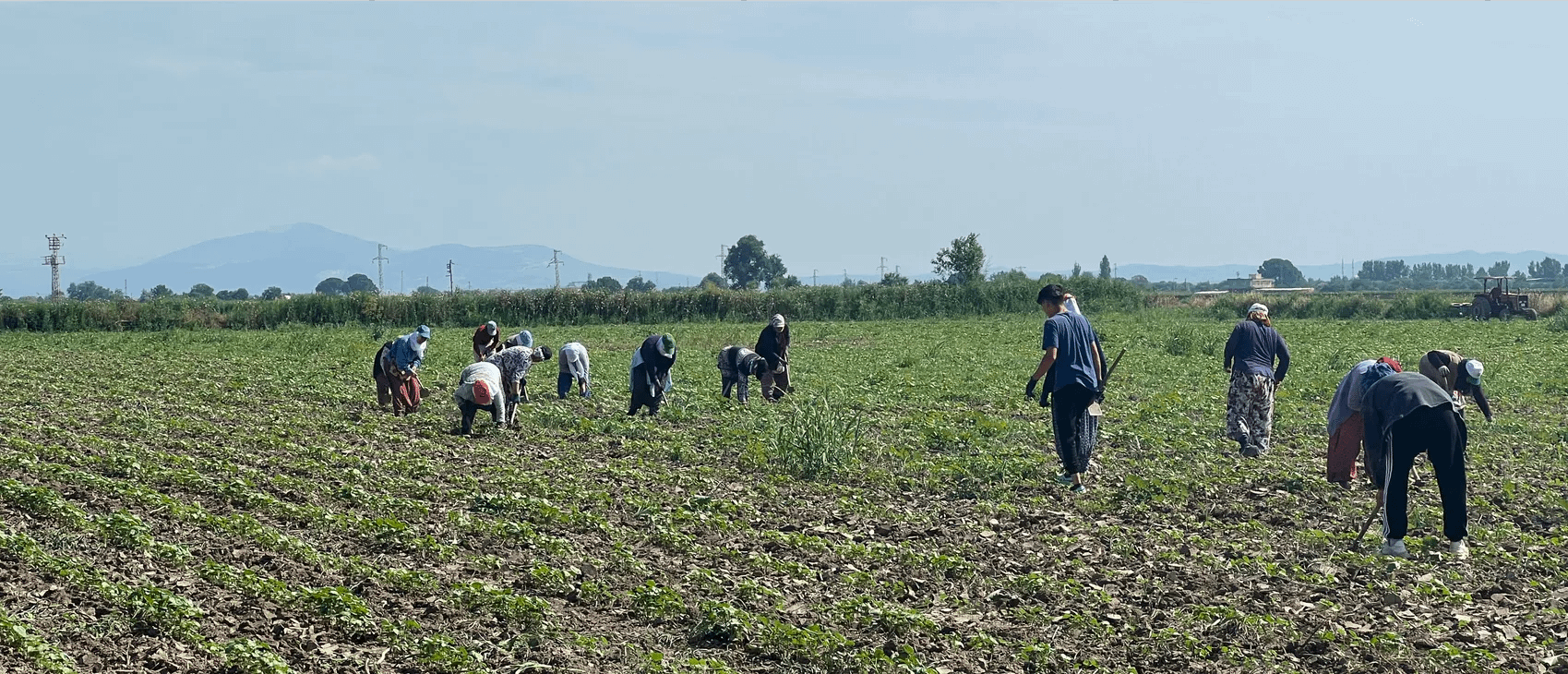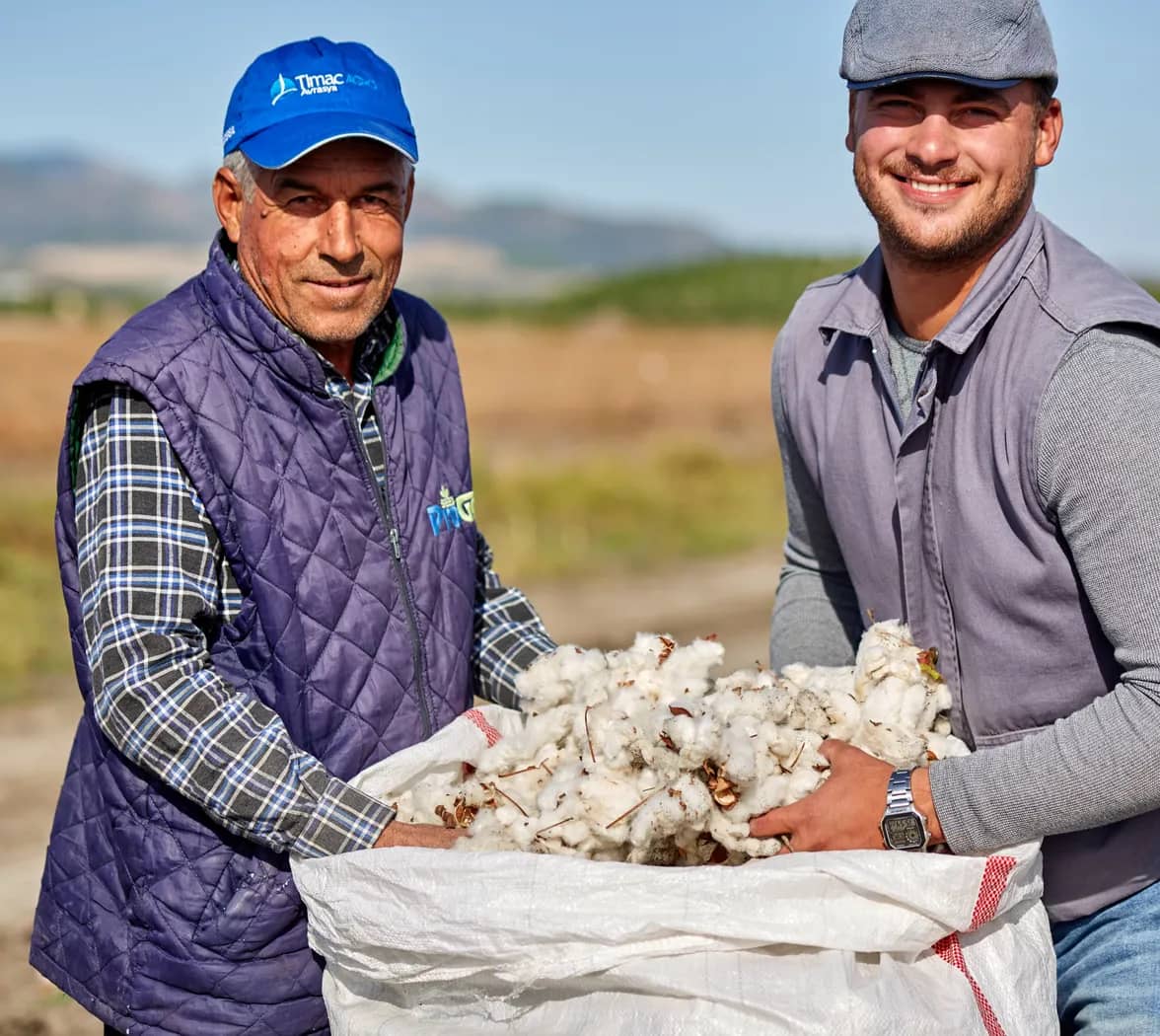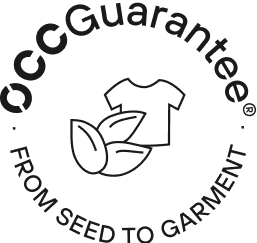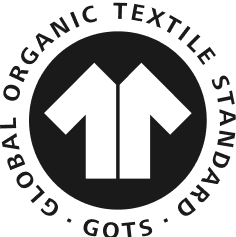Aegean Turkish cotton from the regenerative project by EGE ORGANICS in Esmina, Turkey. EGE ORGANICS is a pioneering family-owned agricultural company in the cultivation and certification of organic cotton in Turkey since 1993. We have been sourcing their certified organic cotton since 2015 and now embrace and promote their new initiative of organically cultivated cotton with regenerative practices.

The regenerative cultivation of Turkish cotton that optimizes CO₂ capture
EGE ORGANICS bases its regenerative cotton project on the principles of Carbon Farming, an agricultural technique aimed at maximizing the potential of agriculture to sequester large quantities of CO2 and thus mitigate climate change.
Regenerative practices rely on the mulching system, a protective layer made of biomass that covers and shields the bare soil while releasing nutrients organically as it decomposes. This approach also involves crop rotation and cover cropping. Only biopesticides are used, and irrigation is supplied through drip systems.
With the Aegean Turkish cotton that we obtain, recognized and valued for its long fibre and high uniformity, we not only enhance our commercial offering but also support ways of doing things that enrich us all and genuinely combat climate change.
The pillars of the EGE ORGANICS Regenerative Cotton project

EGE ORGANICS Regenerative Cotton, a pioneering project in Turkey.
This project originated in 2022 in collaboration with the Ministry of Agriculture and the Turkish Agricultural Research Institute, the International Agricultural Research and Training Center (UTAEM), the Organic Agriculture Organization (ETO), and the NGO ASTAB.
The richness of this proposal opens up a new way of cultivating, optimizing the entire process: it enhances plant photosynthesis to improve soil health, increases crop resistance, and enhances nutrient density. It increases soil organic matter, promotes biodiversity and water retention, and captures carbon at greater depths, reducing atmospheric CO2 levels, combating soil degradation caused by humans.
The Carbon Flux System tool is used to analyse the level of soil and plant CO2 sequestration.
A holistic project that combines various regenerative agricultural practices:
No-till farming
The soil is not tilled; plants are directly planted at only 3 or 4 cm deep, preserving the topsoil layer and allowing crops to grow with better water retention, promoting the growth of microorganisms while maintaining soil health.
Mulching
The bare soil is covered with a layer of chopped grass and other plants that protect it from rain and wind erosion. Over time, the mulch decomposes, releasing nutrients in an organic and beneficial form for cultivation.
Drip irrigation
Plants’ roots are directly irrigated through a drip device, significantly saving water (only 50 litres of water per square meter).
Certified organic fertilizer
Liquid organic fertilizer made from biogas plant residues is used to increase soil organic matter and improve the quality and quantity of nutrients for plants.
Cover cropping
Green fertilization with vetch covering the field after cotton harvest to prevent erosion, improve water infiltration, and retain moisture. Vetch has a great nitrogen-fixing capacity due to its deep roots, preventing soil erosion and improving its structure.
Crop rotation
Alternating different crops each season according to the following schedule: Main Crop (Cotton, Hemp) / Barley Vetch / Main Crop (Cotton, Hemp) / Barley Vetch / Fallow Land / Wheat Sowing; promotes the natural recovery of soil nutrients.
Aegean Turkish cotton, the highest-quality Upland variety
Our OCCRegenerative® Turkey cotton is a high-quality Upland cotton of the Aegean variety, also known as "Turkish Cotton" or "Ege pamuğu" in Turkish.
This cotton has been cultivated for over 5,000 years, mainly in the Mediterranean region of the Aegean, including parts of Turkey and Greece. Archaeological findings indicate that cotton textiles were produced in the Aegean region during the Bronze Age from 3000 BC to 1200 BC.
The unique climate and soil conditions of the region undoubtedly contribute to the exceptional quality of Aegean cotton, considered one of the best Upland cottons in the world for the length of its fibres (29.5 to 32 mm), its natural shine and softness, high uniformity, and minimal yellowing.
Natural ecru colour for high-quality fabrics
We source Aegean cotton in its natural ecru colour, enabling us to craft fabrics in cream tones for the production of high-quality clothing. Additionally, we use our OCCRegenerative Turkey cotton fabrics for dyeing, employing natural processes free of harmful chemicals to achieve a wide range of colours.



Our Turkish cotton OCCRegeneartive® Turkey holds recognized official certifications for both organic and regenerative practices.



Do you want to know more about what we can offer you?





